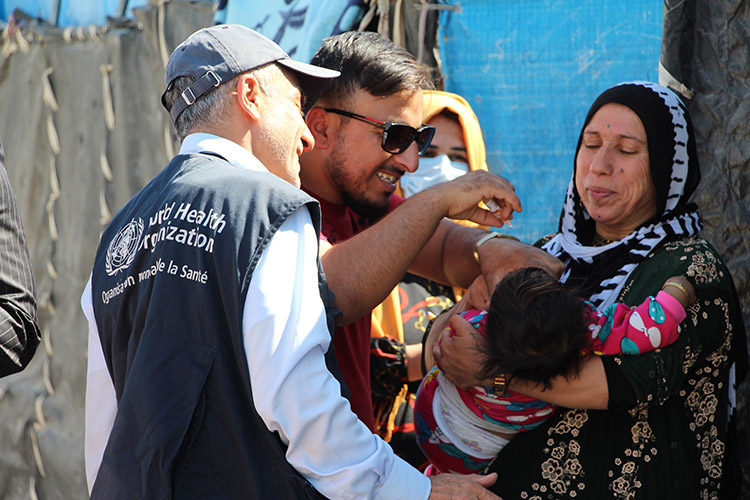 Immunization Campaigns leaving no child behind in Iraq
Immunization Campaigns leaving no child behind in Iraq
Baghdad, 28 April 2021 – Every year from 24 to 30 April, WHO, UNICEF, and all health partners in Iraq join the global community to celebrate World Immunization Week. This year, under the theme "vaccines bring us closer," the World Immunization Week urges greater engagement around immunization globally and at the country level to promote the importance of vaccination, and to improve health and well-being, for all.
The World Immunization Week aims to promote vaccines to protect people of all ages against vaccine-preventable diseases. Immunization saves millions of lives every year and is widely recognized as one of the world's most successful health interventions. Vaccines are safe and effective and can positively impact the population's health when immunization rates are high. Yet, there are still many children in Iraq today not getting the vaccines they need, and many people missing vital vaccines during adolescence, adulthood, and old age.
For over 200 years, vaccines have protected us against diseases that threaten lives, livelihoods and prohibit our development. With their help, we have progressed without the burden of diseases like smallpox and polio, which cost humanity hundreds of millions of lives and cripples millions of children worldwide. Vaccines themselves continue the advance to a world free from hepatitis B and cervical cancer.
In 2021, the World Immunization Week comes as COVID-19 vaccines are being rolled out worldwide, including in Iraq. There has never been a better time than now for vaccines to bring communities and loved ones closer. Many families and friends have not physically met and seen each other because of the COVID-19 pandemic. COVID-19 vaccines are the best option for ensuring families will be able to meet their loved ones again.
As part of the 2021 campaign, WHO, UNICEF, health partners, and individuals worldwide are uniting to increase trust and confidence in vaccines, maintain and increase vaccine acceptance, and increase investment in vaccines, including routine immunization, to remove barriers to access. While the world focuses on critically important new vaccines to protect against COVID-19, there remains a need to ensure routine vaccinations are not missed. Many children have not received vaccination doses during the global pandemic, leaving them at risk of serious diseases like measles and polio. For example, in the first half of 2020 alone this resulted in over 160,000 children in Iraq not getting vaccinated against measles.
WHO, UNICEF, and the Iraq Health Authorities invite more partners to join us and support a lifesaving cause as we build solidarity and trust in vaccination as a public good that saves lives and protects health. Investments and new research are enabling groundbreaking approaches to vaccine development, which are changing the science of immunization forever.
In Iraq, WHO and UNICEF reaffirm their commitment to continue working with and supporting the Ministry of Health to ensure that all people in need of vaccines in the country, especially children and the vulnerable groups like women, the elderly, people with chronic conditions, internally displaced populations and refugees continue to receive all required vaccines, including COVID-19 vaccines. The overarching aim is to reach all people, including in hard-to-reach areas of the country.
WHO and UNICEF reiterate that vaccines are safe and effective and the best and only way to keep all people protected against vaccine-preventable diseases and urge everyone eligible to get the COVID-19 vaccine as soon as possible.


